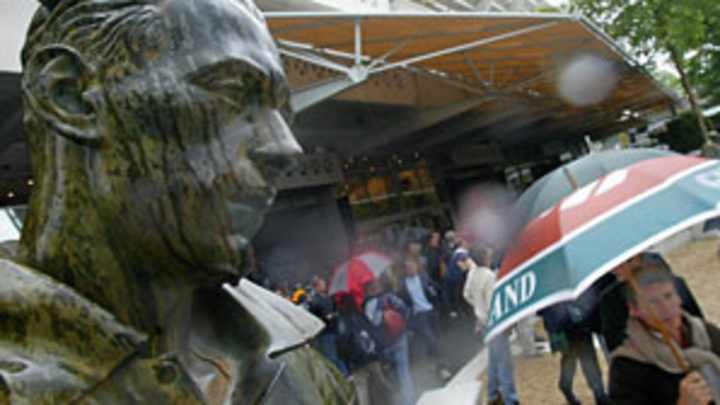Self-reliance proves key virtue for American's French Open pilgrimage

PARIS -- The thing I love most about this city is its indifferent personality, particularly when it comes to hosting out-of-towners. Where other places bend over backwards to be at a visitor's beckon call, Paris hisses "get it yourself."
It's not rudeness inasmuch as a resolve to make newcomers self-sufficient that stirs the Parisian spirit, and hard lessons loom at every turn. Locals demand you speak French even though many of them speak mellifluous English. Policemen expect you'll find your own way, no matter how pitifully lost you might look. Even the subway is laissez-faire: if you want to get in or out, you have to open the doors yourself.
So it fits that the city's Grand Slam might also seem aloof at first blush. Walking the soggy Roland Garros grounds on a slate gray afternoon, I saw little of the exuberance I had come to associate with other Grand Slam stops. In lieu of the boisterous beer drinkers that loiter around Melbourne Park during the Australian Open, here it was smokers who dominate the landscape, each seemingly in competition over who could exude the quietest cool. At Wimbledon, the crowds show their exceeding enthusiasm for the game by dressing the part. At Roland Garros, revelers dress no differently for matches than they would for happy hour mixer -- which is to say impeccably.
And then there's the ubiquitous commercialism, something I had thought was an exclusively American product until earlier this week. As at the U.S. Open, the ads are everywhere as are corporate kiosks, which pitch everything from big banks to bigger tennis balls. But unlike U.S. Open vendors, who refuse to rest until they've sold you something (even if it's free), their French Open counterparts aren't nearly as energetic -- or so they would have you believe initially.
At one point early in the afternoon, when women's quarterfinal matches at Courts Suzanne Lenglen and Philippe Chatrier had turned the main spectator drag that separates the two stadiums, Allée Marcel Bernard, into an abandoned strip, a most curious thing happened: a chant duel broke out among the kiosk vendors. The sing-off rambled from the magazine stands at one end of the drag to an apparel stand just opposite Chatrier. There, one cheerful saleswoman there told of how her fellow vendors have made sport of taking popular songs and infusing them with Roland Garros-themed lyrics in a bid to whip passer-bys into the spirit of commerce.
The French Open songbook borrows liberally from the karaoke bar. Nods range from Elton John ("Can You Feel the Love Tonight") to Queen, whose jock jam classic "We Will Rock You" she and her two colleagues happily performed upon request:
Quand je viens a Roland (When I come to Roland)Je suis très content (I am very happy)Il y a des porte-clés (There are key chains)Ils sont trop géniales (They are too cool)Il y a aussi des gadgets (There are also gadgets)Et puis des raquettes (And rackets)Et encore des serviettes qui sont très chouettes (And also towels that are very neat)Ro-land Ro-land Gar-rosWhoo!Gar-rosWhoo!Ro-land Ro-land Gar-rosWhoo!Gar-rosWhoo!
You might laugh, but within that rockin' sales pitch lies this abiding truth about Paris: the real key to the city is to show a little initiative; when you do, it amazes you with just how widely it opens up. It's just as true of Roland Garros. In particular at the Place des Mousquetaires, the ground's central plaza, a little kindness got me more than I bargained. When I plopped down there with a friend to watch the quarterfinal between Roger Federer and Robin Soderling on the big screen (alas, I had no ticket), the old man sitting next to me shot us a sour look. But when, while posing for one of many goofy photos between the legs of a statue of Henri Cochet, I asked the man in French if I was blocking his view, he quickly softened. Before long, he was not only giving me a detailed history lesson on Cochet -- an eight-time Slam winner who helped France to six straight Davis Cup victories -- but giving it in English, even we had been kibitzing in French to that point.
We had a delightful time until the rain came tumbling, and -- just like that -- I was pleading all over again for Paris to show a little restraint. By the time the rains relented, few of Roland Garros' cold and soggy revelers were still in the mood for tennis. Federer didn't look like he was either. And when Soderling broke him in the 11th game of the third set, en route to the inexorable end of Federer's streak of 23 straight semifinals, neither was I. (If you'd seen the uneventful mixed doubles match I started the day with, you'd be calling me a trooper.)
I gathered my things and made for the exits, and -- of course -- on my way out approached a policeman for directions for the Metro back into the city. He offered a few suggestions before finally raising his hands in defeat. Still, he added merrily, "I'm confident you'll find it." Much as that might seem dismissive, it's really the best compliment a foreigner can receive in Roland Garros and Paris, where self-reliance yields far more than merely a warm experience. It yields respect.

Andrew Lawrence is an SI staff writer, specializing in motor sports for the website and magazine. Follow him on twitter @by_drew.